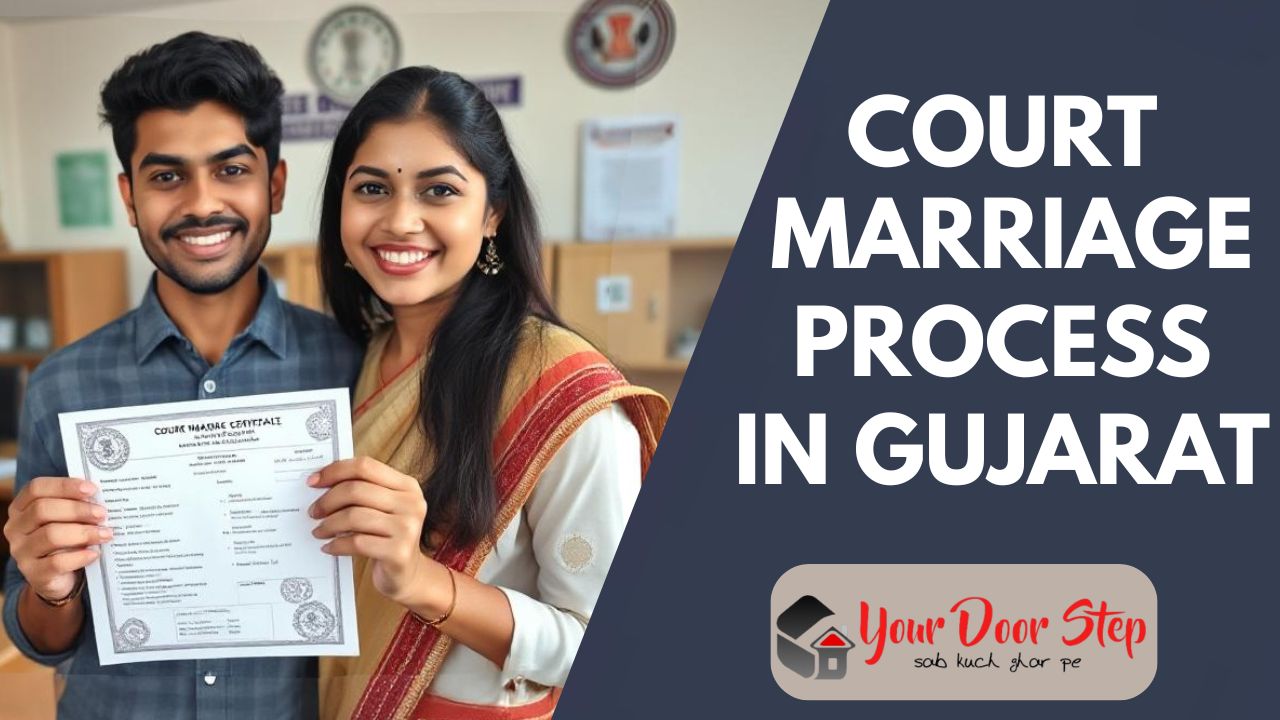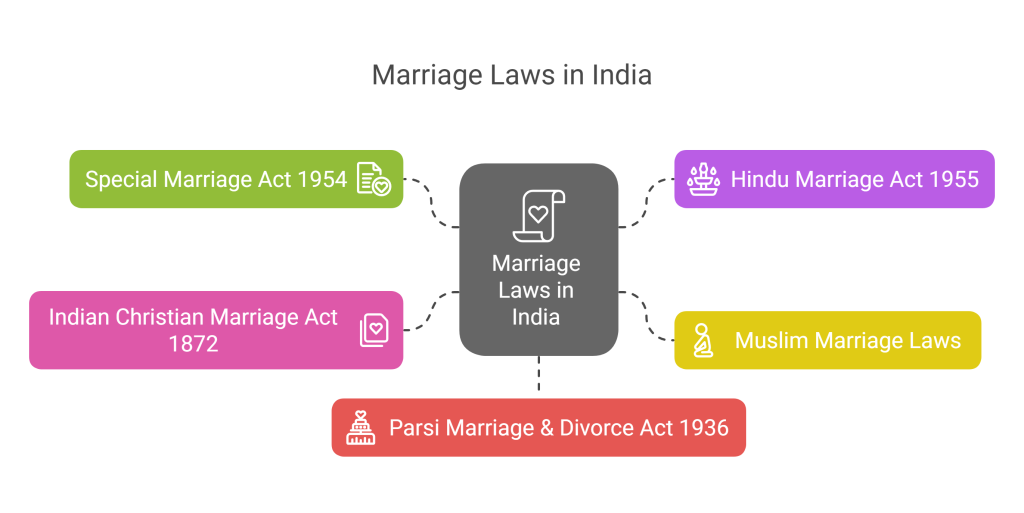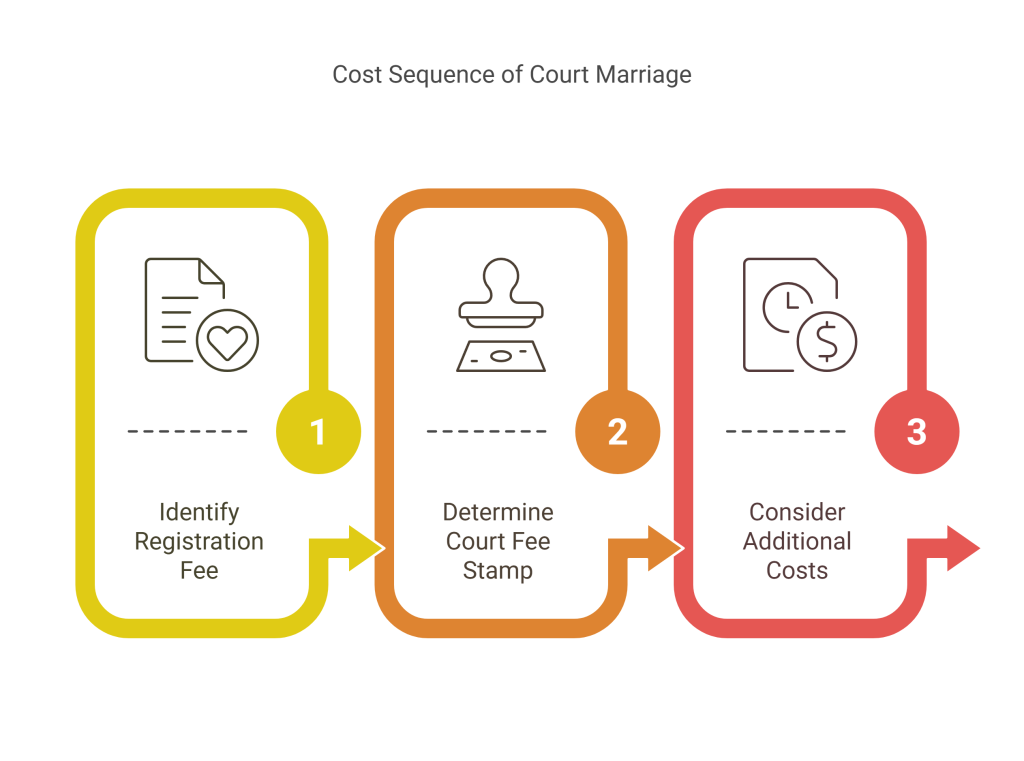
Court Marriage Process In Gujarat – A Complete Guide For 2025
Marriage is one of the most important events in one’s life, regardless of whether they follow the religious rituals or the legal process.
A court marriage is currently preferred by most couples in Gujarat because it gives a legal foundation to their marriage. It appears that you are unaware of how court marriages work in Gujarat; that is why you are here. Don’t worry; you’re in the right place. We will explain the court marriage process in Gujarat in this blog. Read on to learn how to complete your marriage registration quickly and smoothly.
What Is A Court Marriage?
The Special Marriage Act of 1954 and court marriage allow Indian citizens to get married using civil procedures. Anyone from any religion or caste in Gujarat can have a court marriage. This type of marriage does not involve religious rituals; it’s just a simple legal process.
Gujarat court marriages are easy because you only need a few essential documents. You don’t have to have a big wedding ceremony. An official will record the marriage, making it legally valid. This way, court marriages in Gujarat are straightforward and simple.
Why Choose Court Marriage In Gujarat?
The state of Gujarat provides a simple legal court marriage process in Gujarat for couples to perform their marital union.

Read Also:- Name Change Ad in Hindustan Times Bastar
1. Legal Recognition
There are several reasons why people choose the court marriage process in Gujarat:-
The state government recognizes court marriages through official acknowledgment. The marriage grants each spouse full legal status, which includes the right to inherit and possess property and the ability to initiate divorce proceedings if necessary.
2. Simple And Quick Process
Court marriages differ from standard weddings because they eliminate both duration and expense. The required documents the couple submits result in a typical processing time of weeks.
3. Suitable For Interfaith And Inter-Caste Marriages
People under the Special Marriage Act of 1954 obtain the right to wed without considering religious or ethnic factors. Court marriage serves as an excellent choice for interracial couples and multicultural pairs in Gujarat because it eliminates religious or cultural barriers.
4. No Dowry Or Extra Expenses
People who seek an affordable, simple wedding that does not involve dowry payments or expensive wedding ceremonies opt for court marriages.
5. Privacy And Personal Choice
Couples who want a private marriage avoid including their extended family members or community celebrations during their wedding ceremonies. Couples can establish their marital relationship through court marriage by performing a private legal registration process.
If you are thinking of legally marrying in Gujarat, you might consider a court marriage process in gujarat since it is affordable, convenient, and minimal expense.
Eligibility Criteria For Court Marriage In Gujarat
To have a court marriage process in Gujarat, you must follow the Special Marriage Act of 1954 rules. Here are the main conditions:
1. Minimum Age
- The bride must be at least 18 years old.
- The groom must be at least 21 years old.
2. Free Will And Consent
- Both partners must agree to the marriage willingly.
- Forcing someone into marriage is against the law.
3. Notice Of Marriage
- The couple must give written notice to the marriage registrar.
- This notice is displayed publicly for 30 days so that anyone can raise objections.
These conditions must be met for a court marriage process in Gujarat to be legally valid.
Important Laws For Court Marriage & Marriage Registration
The following laws are applicable in India for court marriages and marriage registrations.

- Special Marriage Act 1954 – Allows people from any caste or religion to marry in court without traditional rituals.
- Hindu Marriage Act 1955 – Applies to Hindus, Jains, Sikhs, and Buddhists. Both partners must be from these religions, but caste doesn’t matter. Some traditional rituals are followed.
- Marriage of Muslim Partners – If both partners are Muslim, they follow Muslim laws and rituals. After performing these rituals, they get a marriage certificate from the court.
- The Indian Christian Marriage Act of 1872 – If both partners are Christians, they marry in a church and get a marriage certificate from the court.
- Parsi Marriage & Divorce Act 1936 – If both partners are Parsi, the court registers their marriage and gives them a certificate under this act.
Process Of Court Marriage In Gujarat
Generally, the court marriage process in Gujarat involves the following actions:-

Step 1. Submit The Application
- The marriage registrar operates from a local administrative office.
- Married couples must provide a marriage application form at the designated marriage registrar facility.
- The partners can execute the application process independently or assign someone else to handle it.
Step 2. Submit Required Documents
A couple must follow the legal procedure for court marriage in Gujarat by submitting the following documents:-
- The required age testimony includes a birth certificate, passport, or a school leaving certificate.
- The required address documents include an Aadhar card, voter ID, or passport.
- Photographs of both partners
- The partners must submit a declaration proving they are unmarried to any other person.
- A duplicated copy of their public declaration about marriage intentions.
Step3. Notice Period (30 Days)
- The marriage registrar will place the notice of marriage in public view at the office.
- The notice remains visible at the office for thirty days to enable anyone to file objections.
- The marriage ceremony can start after an objection-free period of display.
Step 4. Marriage Registration
- The partners must appear at the registrar’s office thirty days after posting their banns.
- The marriage official performs the ceremony in front of both witnesses when the marriage takes place.
- After successful completion, the marriage officer will issue the marriage certificate.
Step 5. Marriage Certificate
- A marriage certificate is an official document that signifies the validity of the marriage union between two parties.
- The marriage certificate is a required official document for various procedures, including passport applications, updates to marital status, and inheritance claims.
The court marriage process in Gujarat will help couples legally and smoothly perform a court marriage in Gujarat.

Important Documents Required For Court Marriage Registration In Gujarat
To get married in Gujarat court, couples must provide certain documents to their local authorities. Here’s a list of what you need:-
- Affidavit: Both partners must sign a joint affidavit stating their intention to marry, where they live, and their marital status and nationality.
- Proof of Identity and Nationality: You can use an Aadhaar card, passport, or voter ID to prove your identity and nationality.
- Proof of Address: You need official documents like utility bills or a rental agreement to show where you live. These documents should prove you’ve lived there for at least 30 days.
- Passport-Size Photographs: You need recent photos of both partners for the marriage registration.
- Age Proof: You can use a birth or school leaving certificate to prove your age. The bride must be at least 18, and the groom must be at least 21.
Benefits Of Court Marriage In Gujarat
Court marriage in Gujarat offers several advantages for couples who prefer a simple and legal process:-
1. Legally Recognized
- A court marriage is officially registered, making it valid across India.
- The couple gets all the legal rights that come with being married.
2. Quick And Simple Process
- Court marriage takes less time than traditional weddings.
- There are no long ceremonies or rituals needed.
3. Cost-Effective
- Court marriage is much cheaper than traditional weddings.
- Couples can use the money they save for other things.
Challenges Of Court Marriage In Gujarat
Court marriage in Gujarat is a good option, but couples might face some challenges:
1. Family Opposition
Sometimes, families don’t support marriages between people from different backgrounds or religions.
This can cause problems for couples who want to be together.
2. Waiting Period
Couples must wait 30 days after giving notice before getting married.
This waiting time can be frustrating for those who want to get married quickly.
3. Social Acceptance
In some traditional communities, court marriages are not widely accepted.
This can affect how people view the couple and their relationship.
Despite these challenges, court marriage is a legal and safe way for couples to marry without religious or social barriers.
Cost Of Court Marriage
Court marriages are generally cheaper than traditional weddings. The cost can vary from state to state, but here’s a rough idea:-

- The marriage registration form requires a small fee, usually between ₹100 and ₹150.
- The court fee stamp varies by state. It can be between ₹100 and ₹200 for a regular certificate or up to ₹2,100 for a fast-track (Tatkal) certificate.
- You might need to pay extra for things like photocopying documents and making affidavits.
So, having some extra money aside for these costs is a good idea.
Timeline For Court Marriage Registration In Gujarat
Court marriage registration in Gujarat takes about 30 to 45 days. Here’s how it works:
1. Notice Period (30 Days)
- The couple gives a marriage notice to the marriage officer.
- The notice is displayed publicly for 30 days so anyone can object.
2. Objection Investigation (If Needed)
- If someone objects, the marriage officer looks into it.
- Depending on how busy they are, this can take longer, up to 60 days.
3. Declaration Ceremony
- If there are no objections or they are dismissed, the marriage officer performs the ceremony.
- The couple signs a declaration in front of the officer and witnesses.
4. Marriage Certificate Issuance
- After the ceremony, the couple gets a marriage certificate.
- This is proof that they are married.
Conclusion
Gujarat citizens can pursue court marriage as a straightforward legal pathway to marriage without conventional ceremonial practices. Under this legal system, people gain protection, enabling them to enter into marriage beyond religious or caste boundaries.
Individuals who want to perform a court marriage within Gujarat or throughout India should consider professional assistance from a Court Marriage in Delhi. Such services guide clients through all necessary legal documentation with cost-effective and convenient services.
Read More:-
1. Birth Certificate Agent in Agra
2. Name Change Ad in Hindustan Times Andaman and Nicobar Islands
3. Birth Certificate Agent in Badradri
Faqs:-
1. What Is A Court Marriage?
A court marriage is a legally recognized marriage conducted under the Special Marriage Act of 1954, without religious ceremonies.
2. Who Can Apply For A Court Marriage In Gujarat?
Any couple can apply regardless of religion or caste, provided they meet the legal age and eligibility criteria.
3. What Is The Minimum Age Requirement For Court Marriage?
- 21 years for males
- 18 years for females
4. Do We Need Parental Consent For A Court Marriage?
No, parental consent is not required if both partners are legally eligible to marry.
5. How Long Does The Court Marriage Process Take?
It typically takes 30 to 45 days, including the mandatory 30-day notice period.
6. What Is The Difference Between Court Marriage & Marriage Registration?
Court Marriage and marriage Registration are different terms. Traditional rules and rituals are followed during marriage registration, while no such rituals are followed during court marriage.
7. Is Parental Consent Necessary For A Court Marriage If Both Parties Are Of Legal Age?
No, parental consent is not necessary if both parties are over the legal age requirement for marriage. The law system itself supports marriage.
Written by
Surbhi Sharma
Content Author at YourDoorStep
Contributor at YourDoorStep.
